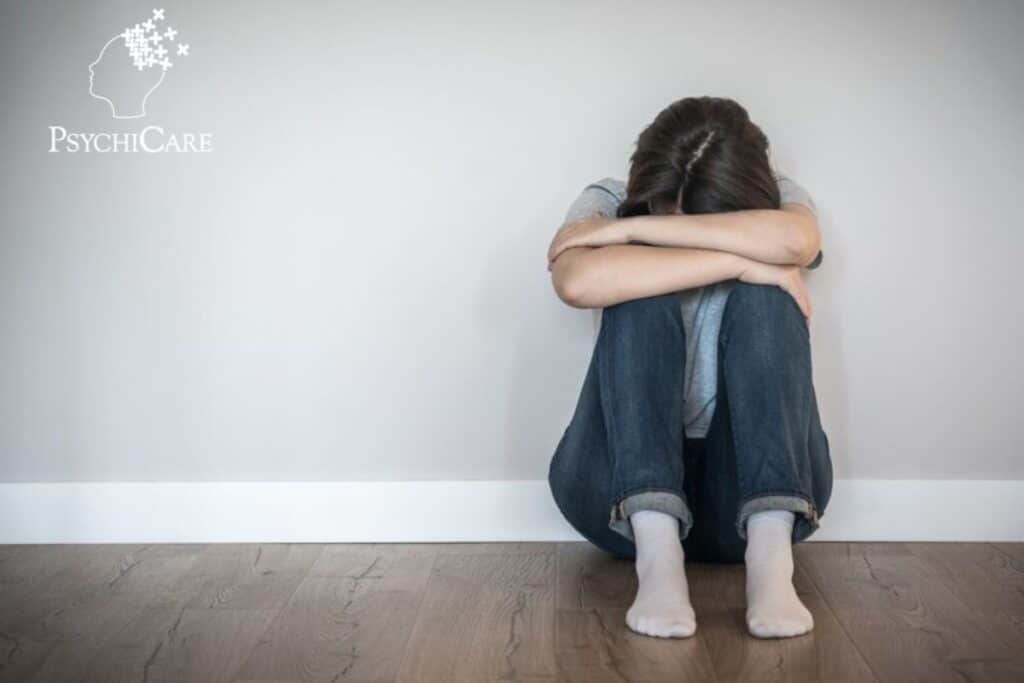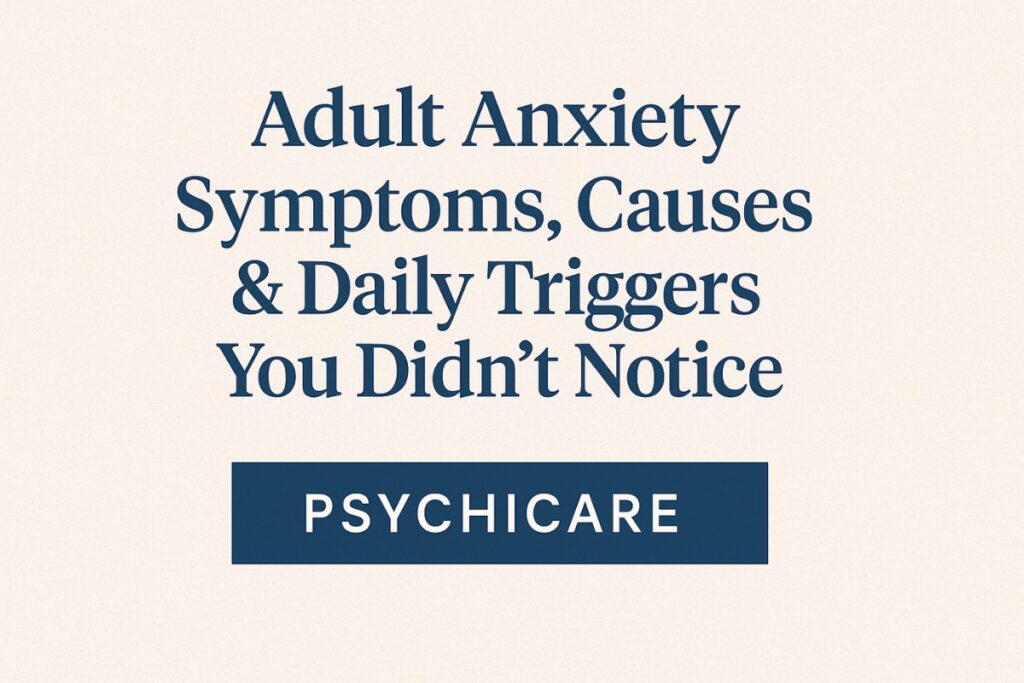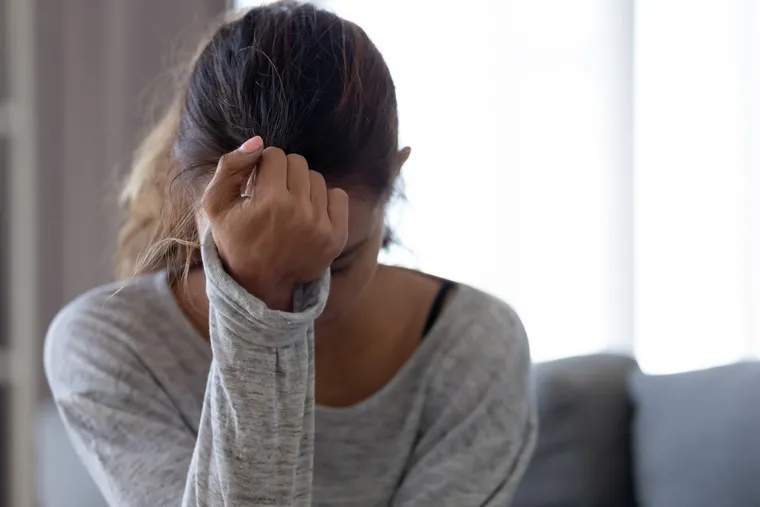Updated on 1 December 2025
Stopping Lexapro can affect your body and mind in ways you may not expect. Many people experience symptoms such as dizziness, brain zaps, stomach discomfort, night sweats, anxiety spikes, and changes in sleep or appetite. These reactions are common and happen because your brain is adjusting to lower serotonin support.
In this updated guide, you’ll learn exactly what Lexapro withdrawal feels like, how long symptoms usually last, which signs are normal, and when withdrawal can become risky. We’ll also cover a safe tapering plan, cold turkey dangers, symptom-specific advice, and a clear timeline so you know what to expect day by day and week by week.
If you’re thinking about reducing your dose or stopping Lexapro, this guide will help you make informed, safe decisions with the right medical support.
What Is Lexapro and How Does It Work?
Lexapro (escitalopram) is an SSRI antidepressant commonly prescribed for depression, anxiety, panic disorder, and mood-related symptoms. It works by increasing the availability of serotonin, a chemical that helps regulate mood, sleep, digestion, and emotional stability.
When taken regularly, Lexapro creates a steady serotonin balance in the brain. This is why many people feel calmer, more stable, and more emotionally regulated while using it. Because the brain adapts to this steady support, stopping Lexapro suddenly or reducing the dose too quickly can lead to withdrawal symptoms, also called SSRI discontinuation effects.
What Is Lexapro Withdrawal?
Lexapro withdrawal happens when the body and brain begin adjusting to lower levels of serotonin support after the medication is reduced or stopped. This reaction is common and does not mean you are addicted. It simply reflects a temporary imbalance as your nervous system recalibrates.
You’re more likely to experience withdrawal if:
- You stop Lexapro abruptly
- You reduce your dose too quickly
- You’ve been on Lexapro for several months or years
- You were taking a higher dose (10–20mg)
- You have a history of sensitivity to medication changes
Withdrawal symptoms can affect both emotional and physical functioning. Some people experience only mild discomfort, while others may feel noticeably unwell for days or weeks. The intensity depends on your dosage, duration of use, and how gradually you taper.

Lexapro Withdrawal Symptoms (Complete List)
Lexapro withdrawal can affect both the body and mind. Symptoms usually appear when the medication is reduced too quickly or stopped suddenly, and they vary from mild to uncomfortable depending on dose, duration, and taper speed. Below is a complete list of symptoms people commonly report during withdrawal.
Brain Zaps
Brain zaps feel like brief electrical shock sensations in the head.
They are one of the most common SSRI withdrawal symptoms.
Why they happen:
A sudden drop in serotonin levels affects how brain signals fire, leading to these short bursts of electrical-like sensations.
How long they last:
They often last a few days to a few weeks, depending on how quickly the dose was reduced.
What helps:
- Slower tapering
- Omega-3 supplements (doctor-approved)
- Staying hydrated
- Gentle movement/exercise
Dizziness and Lightheadedness
Many people feel dizzy, unsteady, or slightly “floaty” during withdrawal.
Why it happens:
Serotonin is involved in balance and spatial orientation.
A sudden reduction can temporarily disrupt the inner ear and nervous system.
When to see a doctor:
If dizziness causes falls, fainting, or severe imbalance.
Stomach Pain, Nausea, and Digestive Upset
Withdrawal often affects the digestive system because serotonin receptors also exist in the gut.
Common issues include:
- Stomach cramps
- Nausea
- Stomach burning
- Diarrhoea or loose stools
- Loss of appetite or sudden hunger changes
When it usually improves:
Within 1–3 weeks for most people.
Night Sweats and Hot Flushes
Sudden sweating, overheating at night, or waking up drenched are common.
Why it happens:
Serotonin influences body temperature regulation; a sudden drop can confuse the system temporarily.
When to worry:
If night sweats come with fever, severe chills, or intense weakness.
Fatigue and Low Energy
Feeling unusually tired or heavy is a typical part of withdrawal.
Causes include:
- Sleep disruption
- Serotonin imbalance
- Emotional stress from tapering
Fatigue usually improves gradually as your brain adjusts.
Anxiety Rebound
You may feel:
- Nervous
- Restless
- “On edge”
- Jittery
- More sensitive to stress
This does not always mean your original condition is returning. It is often a temporary serotonin imbalance.
Mood Swings and Irritability
Many people report sudden emotional shifts, frustration, crying spells, or feeling overwhelmed. This is normal during SSRI adjustment.
Headaches and Flu-Like Symptoms
Withdrawal can sometimes feel like a mild flu, with:
- Headaches
- Body aches
- Mild chills
- Low energy
These symptoms generally settle as serotonin levels stabilise.
Sleep Disturbances
You may experience:
- Trouble falling asleep
- Waking up frequently
- Vivid dreams
- Restless sleep
Sleep tends to improve with consistent tapering.
Weight and Appetite Changes
Some people notice changes such as:
- Mild weight loss
- Increased or decreased appetite
- Changes in digestion due to gut, brain serotonin shifts
These changes are usually temporary.
Less Common but Reported Symptoms
A small number of users also report:
- Tingling in arms or legs
- Feeling emotionally “numb”
- Difficulty concentrating
- Temporary memory lapses
- Sensitivity to light or sound
These are uncomfortable but generally fade as adjustment continues.
Lexapro Withdrawal Timeline (When Symptoms Start and How Long They Last)
Lexapro withdrawal does not follow the exact same pattern for everyone, but there is a typical timeline that most people experience. The timing depends on your dose, how long you were on the medication, and whether you reduced the dose slowly or stopped too quickly.

When Do Lexapro Withdrawal Symptoms Start?
Most people begin noticing symptoms between 24 hours and 3 days after lowering their dose or stopping completely.
Withdrawal may start earlier if:
- You were on a high dose (10–20mg)
- You stopped suddenly
- You are sensitive to medication changes
Withdrawal may start later if:
- You tapered slowly
- You were on a very low dose (5mg or below)
How Long Does Lexapro Withdrawal Last?
For many people, symptoms last:
✔ 1–3 weeks — most common
✔ 4–6 weeks — if the dose was higher or suddenly stopped
✔ Several months (rare) — usually due to very fast tapering or long-term use
Individual symptoms have their own duration patterns:
- Brain zaps: a few days to 3 weeks
- Dizziness: 1–2 weeks for most, longer if taper was abrupt
- Night sweats: 1–4 weeks
- Stomach upset: 1–3 weeks
- Anxiety rebound: days to weeks
- Mood swings: temporary, usually within the first month
Day-by-Day Withdrawal Timeline (Typical Pattern)
This timeline is a common experience but not universal.
Days 1–3
- First symptoms appear
- Mild dizziness
- Light brain zaps
- Irritability or restlessness
- Sleep changes
Days 4–7
- Symptoms may peak
- Dizziness becomes more noticeable
- Stomach discomfort or nausea
- Night sweats
- Mood swings
- Fatigue
Week 2
- Brain zaps often reduce
- Appetite returns to normal
- Sleep slowly stabilises
- Emotional sensitivity remains
- Energy starts to improve
Weeks 3–4
- Most physical symptoms fade
- Dizziness usually settles
- Mood swings lessen
- Anxiety rebound improves
Week 5–8
- Emotional stability increases
- Occasional mild symptoms may appear during stress
Longer Than 8 Weeks (Rare)
This is more likely if:
- You stopped Lexapro suddenly
- You were using it for several years
- You tapered too quickly
- You have a naturally sensitive nervous system
A slower taper or restarting a low dose temporarily (under medical supervision) often helps.
Symptom Duration Table
| Withdrawal Symptom | Typical Duration | When It Lasts Longer |
|---|---|---|
| Brain zaps | 3 days–3 weeks | Fast taper or sudden stop |
| Dizziness | 1–2 weeks | High dose or long-term use |
| Stomach pain | 1–3 weeks | Gut sensitivity |
| Night sweats | 1–4 weeks | Hormonal sensitivity |
| Fatigue | 1–4 weeks | Irregular sleep |
| Anxiety rebound | Days–weeks | Taper too fast |
| Mood swings | 2–4 weeks | Emotional stress |
| Sleep changes | 1–6 weeks | Caffeine, anxiety, poor routine |
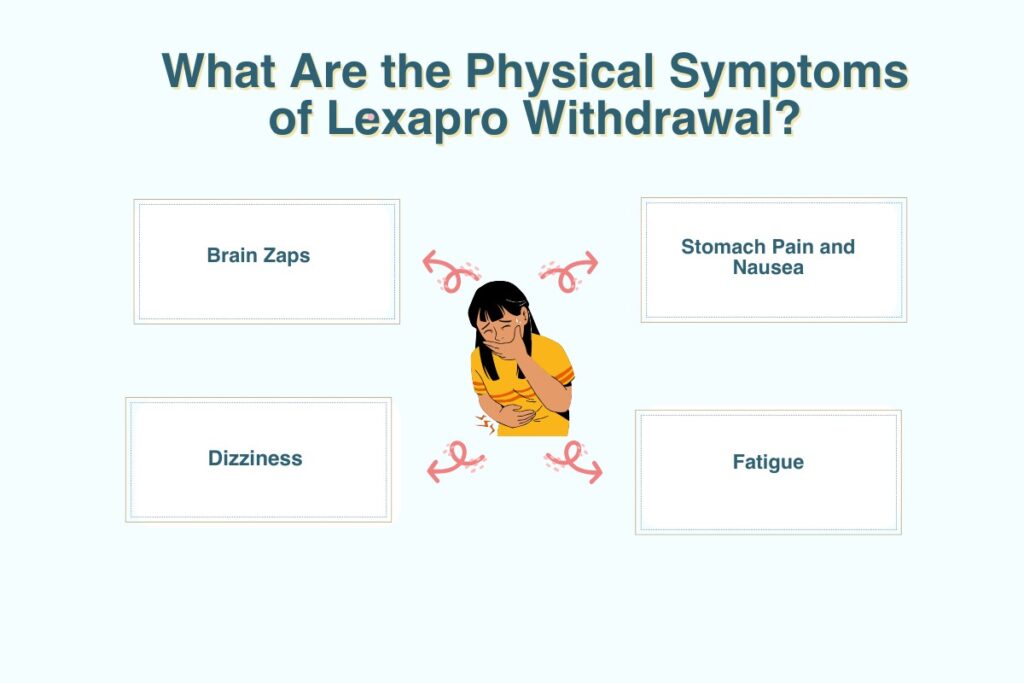
Is Lexapro Withdrawal Dangerous?
Lexapro withdrawal is usually uncomfortable rather than dangerous, but it can become risky in certain situations. The symptoms themselves like dizziness, brain zaps, nausea, or night sweats, are not life-threatening. However, the way withdrawal affects your mood, thinking, and physical stability can lead to complications if not monitored properly.
Here is what you need to know:
✔ Withdrawal itself is not typically life-threatening
You cannot “die” directly from Lexapro withdrawal.
But severe symptoms can increase risks, especially if you stop the medication suddenly.
✔ The main danger comes from abrupt or fast discontinuation
Stopping Lexapro suddenly can cause:
- Intense anxiety
- Severe dizziness
- Panic attacks
- Confusion
- Emotional instability
- Suicidal thoughts
These symptoms can make daily functioning significantly harder and may require medical support.
✔ Withdrawal does NOT cause brain damage
Symptoms like brain zaps or head pressure can feel frightening, but they do not indicate damage to the brain or nerves. These sensations occur because serotonin signalling is temporarily disrupted.
They go away once the nervous system stabilises.
✔ Withdrawal can be dangerous if mental health symptoms return strongly
For some people, stopping Lexapro causes their original symptoms to come back, including:
- Severe depression
- Intense anxiety
- Panic
- Irritability
- Emotional overwhelm
If these become unmanageable, you may need professional help or a dosage adjustment.
✔ Withdrawal is risky for people with a history of severe depression
If you’ve experienced suicidal thoughts or severe depressive episodes before taking Lexapro, sudden withdrawal can trigger those symptoms again.
This is why tapering under medical supervision is important.
✔ Physical dangers occur when symptoms impact safety
Seek help if withdrawal causes:
- Fainting or falls
- Uncontrollable vomiting
- Severe headaches
- Rapid heart rate
- Chest pain
These issues may not be caused directly by withdrawal but can be worsened by it.
Warning Signs You Should Not Ignore
Contact a doctor immediately if you notice any of the following during withdrawal:
❗ Severe suicidal thoughts or self-harm urges
This is the most important sign.
❗ Extreme dizziness leading to falls or fainting
❗ Intense confusion, disorientation, or trouble speaking
❗ Chest pain, severe palpitations, or breathing difficulty
❗ Persistent vomiting or dehydration
❗ Withdrawal lasting more than 8 weeks despite tapering
These symptoms are not typical and may indicate that your taper was too fast or your nervous system needs more support.
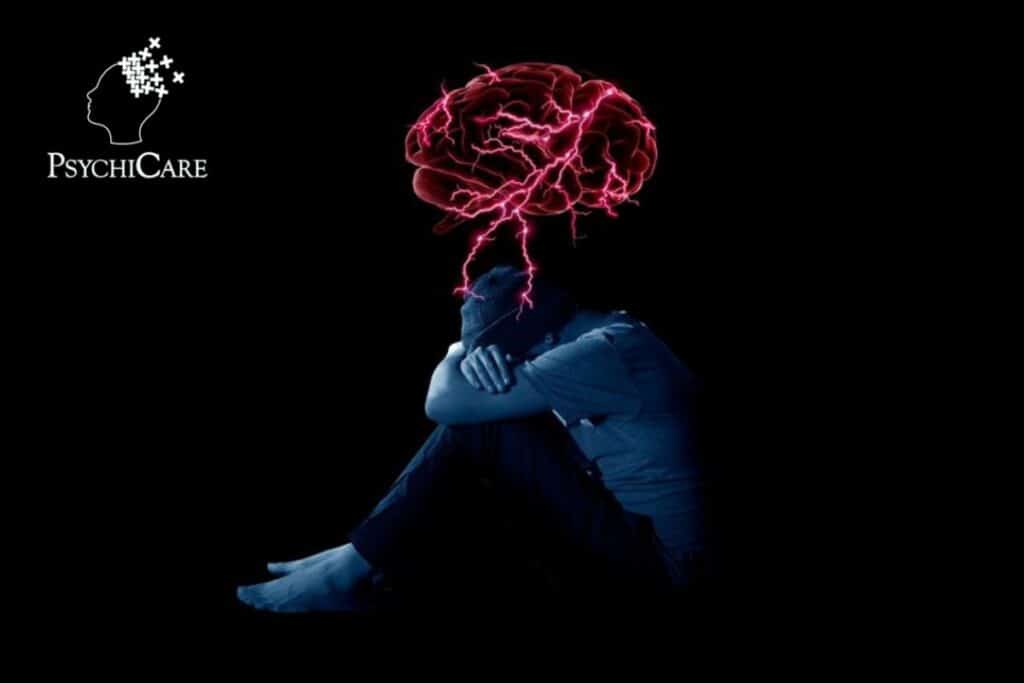
How to Stop Taking Lexapro Safely
Stopping Lexapro safely means reducing your dose gradually so your brain has enough time to adjust. This approach helps prevent severe withdrawal symptoms and reduces the chance of anxiety or depression returning.
Below are the essential steps your doctor will usually recommend when planning a safe Lexapro taper.
1. Never Stop Lexapro Suddenly (Cold Turkey)
Stopping Lexapro abruptly is the main reason people experience:
- Severe dizziness
- Brain zaps
- Intense anxiety
- Night sweats
- Emotional instability
- Stomach problems
- Sleep disruption
Cold turkey withdrawal overloads the nervous system, because the brain suddenly loses its serotonin support.
This is why sudden stopping feels dangerous, frightening or overwhelming for many people, even if they were on a low dose.
2. Reduce Your Dose Slowly (Tapering)
A slow taper allows serotonin levels to adjust gradually.
Doctors usually recommend reducing the dose over weeks or months, depending on:
- Your current dose
- How long you’ve been taking Lexapro
- Whether you’ve experienced withdrawal before
Even dropping from 10mg to 0mg can be too fast for many people.
3. Follow a Step-By-Step Reduction Plan
A typical taper might look like this:
20mg → 15mg → 10mg → 7.5mg → 5mg → 2.5mg → 0mg
Each step is held for 2–4 weeks (or longer if symptoms appear).
This is not a one-size-fits-all schedule, but it reflects how most psychiatrists taper SSRIs to prevent withdrawal.
4. Recognise When Your Body Needs a Slower Taper
Signs you need more time between dose reductions include:
- Dizziness that affects balance
- Persistent brain zaps
- Night sweats
- High irritability
- Panic-like symptoms
- Strong mood swings
You can pause the taper (with your doctor’s guidance) until symptoms settle.
5. Track Your Symptoms During Tapering
Keeping a simple daily log helps you see patterns such as:
- What dose triggered symptoms
- How long each symptom lasts
- Whether you’re tapering too quickly
- Which days feel stable
This information helps your doctor adjust the plan.
6. Avoid Alcohol or Recreational Substances
Alcohol, cannabis, and stimulants can:
- Worsen dizziness
- Trigger panic
- Affect serotonin levels
- Make sleep unstable
- Intensify withdrawal
This is important especially during the first 3–6 weeks of tapering.
7. Maintain Healthy Habits to Support Your Nervous System
These habits help reduce withdrawal intensity:
- Consistent sleep routine
- Balanced meals
- Plenty of water
- Gentle exercise
- Reduced caffeine
- Stress-reduction practices
A stable routine helps your brain adapt more smoothly.
8. Stay in Touch With Your Doctor
Contact your doctor if:
- Symptoms become too uncomfortable
- You’re unsure how long to stay at a certain dose
- You need to pause or slow down
- Withdrawal lasts longer than expected
Most withdrawal issues resolve faster with guided support.
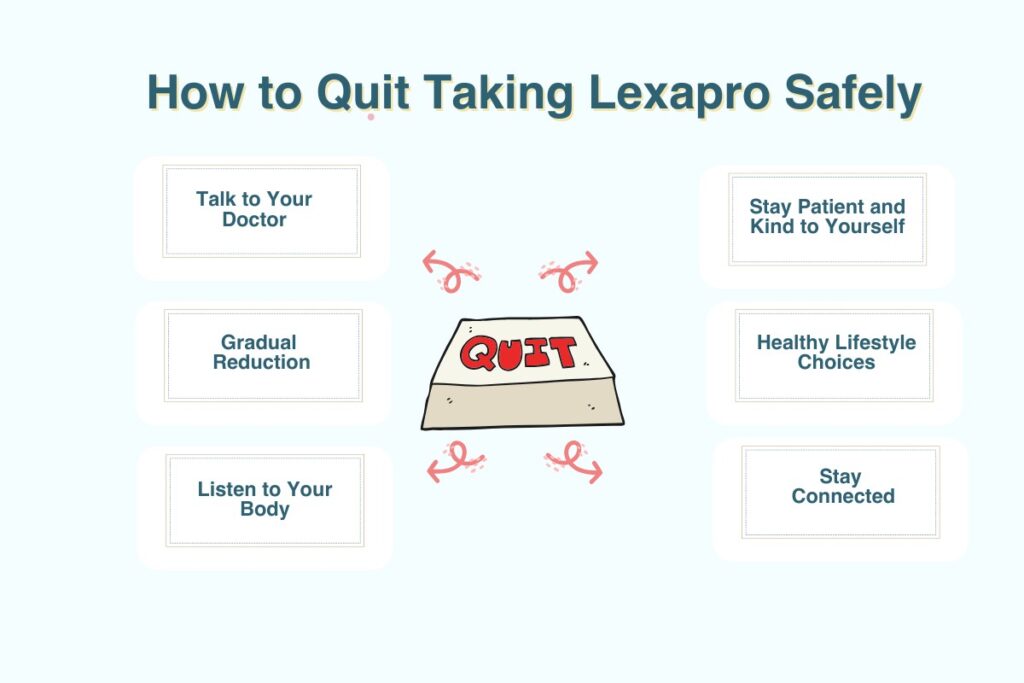
Tapering Off Lexapro (Step-by-Step Guide)
Tapering is the safest way to stop Lexapro. It means reducing your dose in small steps so your brain has time to adjust without sudden serotonin changes. The slower the taper, the lower the chance of withdrawal symptoms like dizziness, brain zaps, anxiety spikes, or night sweats.
Below is a clear, practical guide that reflects how psychiatrists usually manage Lexapro tapering.
Why You Shouldn’t Stop Lexapro Suddenly
Stopping Lexapro cold turkey is the main cause of:
- Severe dizziness
- Electric shock sensations (brain zaps)
- Strong anxiety
- Emotional instability
- Hot flushes and night sweats
- Stomach cramps
- Panic attacks
- Depressive dips
Abrupt withdrawal overwhelms the nervous system.
A slow taper prevents this.
Recommended Taper Schedule
A typical taper uses small dose drops every 2–4 weeks, adjusting based on symptoms.
Here’s a general structure (your doctor will personalise it):
- 20mg → 15mg
- 15mg → 10mg
- 10mg → 7.5mg
- 7.5mg → 5mg
- 5mg → 2.5mg
- 2.5mg → 0mg
Each step should be held long enough for your body to stabilise.
People who are sensitive to medication changes may need even smaller steps.
Tapering Chart by Dose
| Current Dose | Reduce To | Hold For | Notes |
|---|---|---|---|
| 20mg | 15mg | 2–4 weeks | Larger drops are easier at higher doses |
| 15mg | 10mg | 2–4 weeks | Monitor dizziness and headaches |
| 10mg | 7.5mg | 2–4 weeks | Common stage for brain zaps |
| 7.5mg | 5mg | 2–4 weeks | Emotional sensitivity may increase |
| 5mg | 2.5mg | 2–4 weeks | Go slow: stomach issues & night sweats may appear |
| 2.5mg | 0mg | 2–4 weeks | Smallest step → symptoms often mild |
This is not medical advice but a widely used clinical tapering framework.
Your doctor will change the plan depending on how your body reacts.
Hyperbolic (Very Slow) Tapering Method
Some people need extremely small reductions at the end, especially below 5mg.
Example:
5mg → 4mg → 3mg → 2mg → 1.5mg → 1mg → 0.5mg → 0mg
This is common for people who experienced strong withdrawal in the past.
Tips to Reduce Withdrawal Symptoms During Taper
These practical steps significantly reduce discomfort:
✔ Reduce dose only when you feel stable
Do not rush. Stability matters more than speed.
✔ Keep dose reductions small
Tiny reductions can prevent dizziness and brain zaps altogether.
✔ Take Lexapro at the same time daily
Maintains stable serotonin levels.
✔ Stay hydrated
Helps regulate dizziness and headaches.
✔ Limit caffeine
Caffeine worsens anxiety, jitters, and sleep issues.
✔ Maintain regular sleep
The nervous system stabilises faster with consistent rest.
✔ Avoid alcohol
Alcohol can exaggerate withdrawal symptoms.
✔ Light exercise
Walking supports nervous system balance.
When to Pause Your Taper
Pause your taper and consult your doctor if you notice:
- Persistent dizziness
- Strong anxiety
- Night sweats that disrupt sleep
- Severe mood swings
- Intense brain zaps
- Withdrawal lasting more than 3–4 weeks at a step
Pausing is normal.
It helps your nervous system fully adjust before the next reduction.
Home Remedies and Lifestyle Support During Lexapro Withdrawal
Simple daily habits can make Lexapro withdrawal easier to manage. These strategies support your nervous system and help reduce symptoms like dizziness, brain zaps, stomach discomfort, and sleep disruption.
These tips are safe for most people, but always check with your doctor if you have medical conditions or take other medications.
Stay Hydrated Throughout the Day
Dehydration can worsen:
- Dizziness
- Fatigue
- Headaches
- Brain fog
Aim for 6–8 glasses of water a day. Small, regular sips work better than large amounts at once.
Eat Simple, Balanced Meals
Withdrawal can disrupt digestion. Helpful foods include:
- Bananas
- Toast or crackers
- Rice
- Soups
- Oats
- Fresh fruits
- Lean proteins
Avoid foods that trigger nausea or stomach irritation:
- Spicy foods
- Processed snacks
- Heavy fried meals
Small, frequent meals are easier on the stomach.
Limit Caffeine and Alcohol
These substances can increase:
- Anxiety
- Night sweats
- Jitteriness
- Poor sleep
- Heart palpitations
- Mood swings
Reducing or avoiding them for a few weeks can significantly ease symptoms.
Gentle Exercise and Movement
Light movement helps stabilise your nervous system.
Choose:
- Walking
- Light stretching
- Yoga
- Slow breathing exercises
Avoid very intense workouts during the first few weeks if they worsen dizziness or fatigue.
Improve Your Sleep Routine
Many withdrawal symptoms worsen without consistent sleep.
Helpful habits include:
- Sleeping at the same time daily
- Reducing screen time 1 hour before bed
- Dark, quiet bedroom
- Cool room temperature (reduces night sweats)
- Avoiding late caffeine
If vivid dreams or insomnia appear, this usually settles within a few weeks.
Omega-3 and Magnesium (Doctor-Approved Supplements)
Some people find relief from:
- Omega-3 fatty acids (brain zaps, mood swings)
- Magnesium glycinate (muscle tension, anxiety, sleep)
Always confirm supplement use with your doctor, especially if you take other medications.
Keep Stress Levels Low
Withdrawal temporarily heightens your stress sensitivity.
Helpful examples:
- Short meditation sessions
- Slow breathing
- Warm baths
- Listening to calming music
- Spending time outside
- Light routines instead of overwhelming tasks
Even 5–10 minutes daily can help calm the nervous system.
Avoid Major Life Changes During Withdrawal
Try not to make big decisions or start stressful projects during the first few weeks.
Your mind and emotions are adjusting, and stability helps recovery.
Keep a Symptom Diary
Record:
- Dose changes
- Symptoms
- Triggers
- Improvements
This helps you and your doctor understand whether your taper speed is right or needs slowing.
Seek Emotional Support
Talk to someone you trust or a professional if symptoms feel overwhelming.
Many people find reassurance and guidance helpful during tapering.

When to See a Psychiatrist or Therapist
Most withdrawal symptoms are temporary and settle as your brain adjusts. But there are times when professional support is important. Speaking to a psychiatrist or therapist can help you manage symptoms safely, adjust your taper plan, and prevent emotional overwhelm.
Below are the situations where you should reach out for help.
If Your Withdrawal Symptoms Are Getting Worse, Not Better
Reach out to a doctor if:
- Dizziness is affecting walking or balance
- Brain zaps are intense or persistent
- Night sweats are severe
- Stomach issues continue for more than a few weeks
- Fatigue or insomnia is worsening over time
These signs often mean the taper may be too fast.
If You Experience Severe Anxiety or Panic
Withdrawal can temporarily increase anxiety, but extreme or persistent anxiety needs medical attention.
It may mean your nervous system needs a slower reduction or a temporary dose adjustment.
If Depressive Symptoms Return Strongly
Contact a professional if you feel:
- Hopeless
- Emotionally numb
- Unable to control crying spells
- Disconnected from daily life
This may be withdrawal or a return of original symptoms. A psychiatrist can tell the difference.
If You Have Suicidal Thoughts at Any Stage
This is the most important sign.
Seek help immediately if you notice:
- Suicidal thoughts
- Self-harm urges
- Thoughts of giving up
- Feeling unsafe with yourself
These symptoms can appear when serotonin support drops too quickly, and they require urgent support.
If Withdrawal Lasts Longer Than 6–8 Weeks
Most symptoms ease within a few weeks.
If you still feel unwell after two months, your taper may need adjusting.
A psychiatrist can create a slower, symptom-friendly plan.
If You Stopped Lexapro Suddenly
Anyone who stops Lexapro cold turkey should check in with a doctor, even if symptoms feel mild at first. Sudden withdrawal can cause delayed reactions.
If You’re Not Sure Whether Symptoms Are Withdrawal or Relapse
Sometimes withdrawal feels similar to returning depression or anxiety.
A mental health professional can help you understand what’s happening and guide your next steps safely.
If You Need Ongoing Support During Tapering
Working with a therapist can help you manage:
- Mood swings
- Stress
- Anxiety
- Emotional overwhelm
- Life changes during taper
Psychological support makes the process easier and reduces the risk of relapse.
Professional Help at PsychiCare
If you’re finding Lexapro withdrawal difficult, you don’t have to manage it alone. PsychiCare connects you with licensed psychiatrists who understand SSRI withdrawal and can help you adjust your taper safely. They can also support you emotionally, monitor symptoms, and provide guidance through each step.
Sessions are affordable, and you can consult from anywhere.
FAQs on Lexapro Withdrawal
What does Lexapro withdrawal feel like?
Lexapro withdrawal often feels like a mix of dizziness, brain zaps, nausea, night sweats, mood swings, anxiety spikes, and fatigue. Some people also notice flu-like symptoms, headaches, sleep changes, or stomach pain. Symptoms vary depending on dose and how fast you reduce it.
When does Lexapro withdrawal start?
Withdrawal usually starts 24 hours to 3 days after reducing or stopping the dose. It may appear earlier if you stop suddenly or later if you taper slowly.
How long does Lexapro withdrawal last?
Most people experience withdrawal for 1–3 weeks. If you were on a high dose or stopped suddenly, symptoms can last 4–6 weeks. A slow taper usually shortens the duration.
Is Lexapro withdrawal dangerous?
Lexapro withdrawal is usually not dangerous, but it can become risky if you stop suddenly or experience severe symptoms like suicidal thoughts, extreme dizziness, confusion, or chest pain. These require medical attention.
Can Lexapro withdrawal cause dizziness?
Yes. Dizziness is one of the most common withdrawal symptoms. It happens because serotonin affects balance. It usually improves within 1–2 weeks.
How long does dizziness last after stopping Lexapro?
Dizziness typically lasts a few days to two weeks. If tapering was very fast or sudden, it may last longer and require a slower reduction plan.
What are brain zaps in Lexapro withdrawal?
Brain zaps are brief, electric shock-like sensations in the head. They happen when serotonin levels drop quickly and usually settle within 3 days to 3 weeks.
How long do brain zaps last after stopping Lexapro?
Brain zaps usually last a few days to a few weeks. Slower tapering helps reduce their intensity.
Why does Lexapro cause night sweats?
Night sweats happen because serotonin affects body temperature control. A sudden drop during withdrawal can cause overheating at night. This usually improves within 1–4 weeks.
Can Lexapro withdrawal cause stomach pain?
Yes. Stomach pain, nausea, cramps, and digestive issues are common because serotonin also affects the gut. These symptoms often ease within 1–3 weeks.
Is Lexapro addictive?
Lexapro is not addictive. It doesn’t cause cravings or compulsive use. Withdrawal occurs because the brain is adjusting to lower serotonin, not because the drug creates dependence.
What happens if you stop taking Lexapro suddenly?
Stopping suddenly can cause strong withdrawal symptoms like dizziness, anxiety, brain zaps, night sweats, nausea, and mood swings. It also increases the risk of relapse. Always taper slowly.
How do I stop dizziness from Lexapro withdrawal?
A slower taper, staying hydrated, limiting caffeine, eating regularly, and avoiding sudden movements can help. If dizziness causes falls or lasts longer than two weeks, speak to a doctor.
Can you die from Lexapro withdrawal?
No, Lexapro withdrawal itself is not fatal. However, severe symptoms like suicidal thoughts, extreme confusion, chest pain, or dangerously intense anxiety require urgent medical help.
How long does Lexapro stay in your system?
Lexapro stays in the body for about 5–7 days after the last dose, although withdrawal symptoms may last longer as the nervous system adjusts.
Can weight loss happen after Lexapro withdrawal?
Yes, some people notice mild weight loss after stopping Lexapro due to appetite changes or digestive adjustments. This is usually temporary.
How do I taper off Lexapro safely?
The safest way is to reduce the dose slowly—usually in small steps every 2–4 weeks. A common taper is: 20mg → 15mg → 10mg → 7.5mg → 5mg → 2.5mg → 0mg. Follow a doctor’s guidance.
What are the side effects of stopping Lexapro?
Common side effects include dizziness, brain zaps, nausea, night sweats, headaches, mood swings, fatigue, anxiety rebound, and digestive issues.
What happens during SSRI withdrawal?
SSRI withdrawal happens when serotonin levels drop quickly after reducing or stopping the medication. This causes temporary symptoms like dizziness, anxiety, flu-like feelings, and sensory changes.
What does dizziness in Lexapro withdrawal mean?
It means your brain and inner ear are adjusting to lower serotonin levels. This is normal and temporary unless symptoms become severe.
When should I see a doctor during Lexapro withdrawal?
Reach out if you experience severe dizziness, suicidal thoughts, extreme anxiety, persistent vomiting, chest pain, or withdrawal lasting longer than 6–8 weeks.
